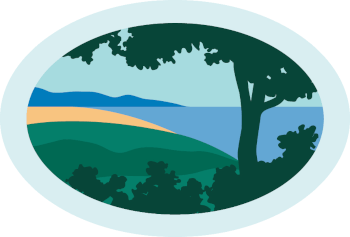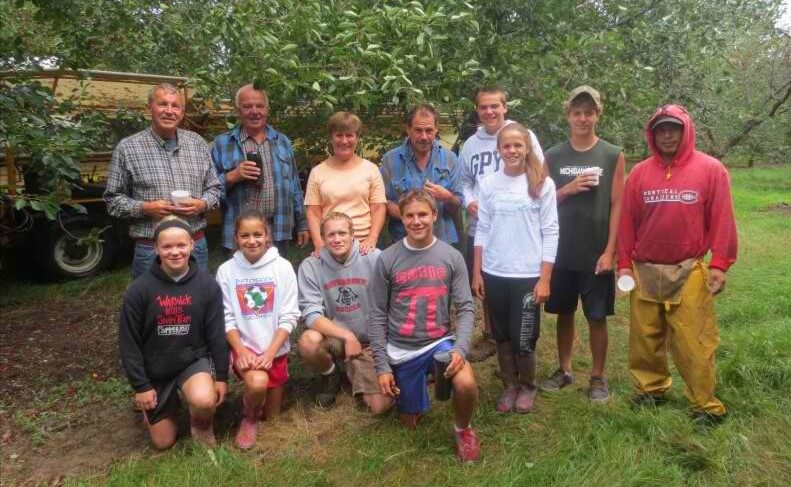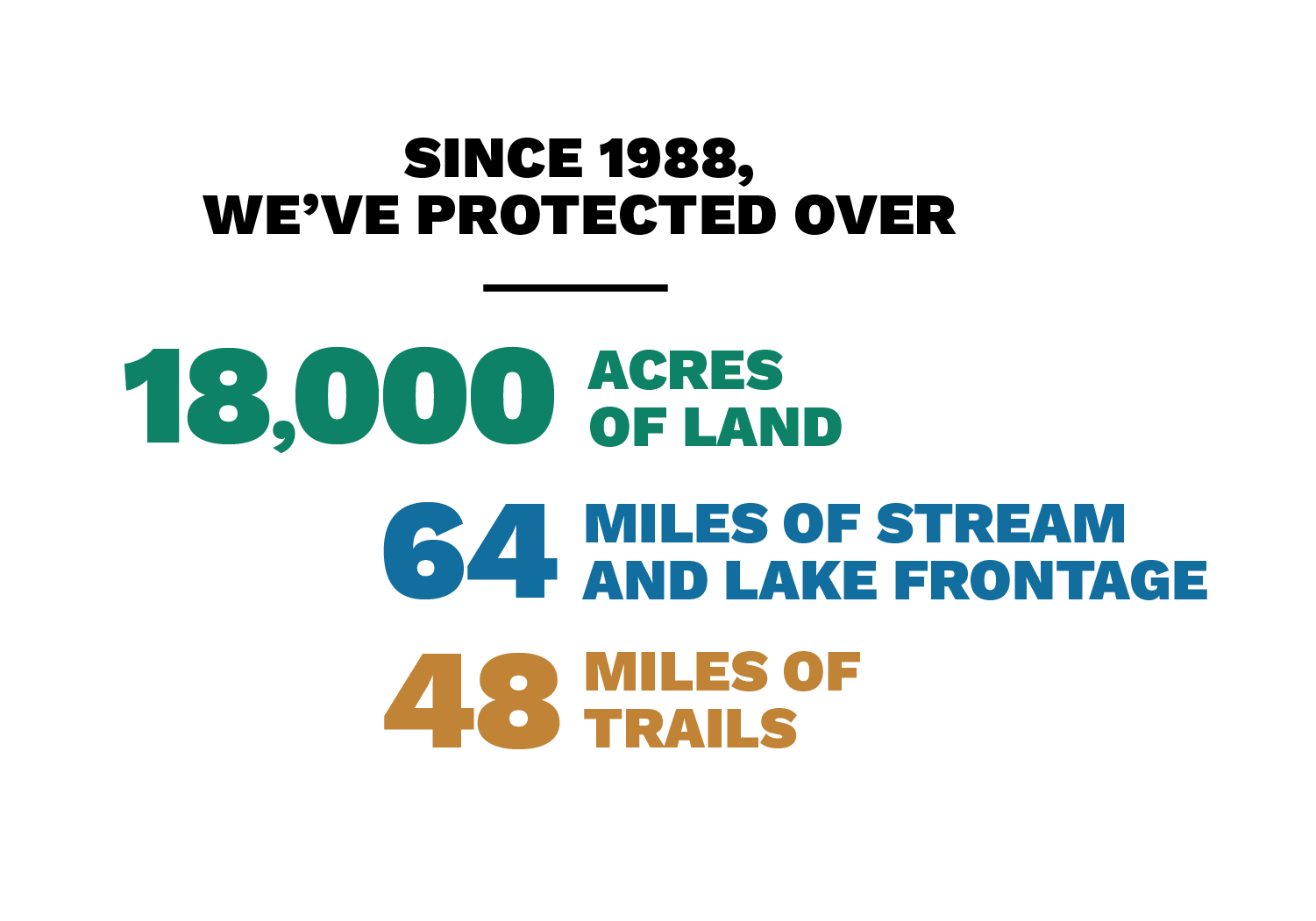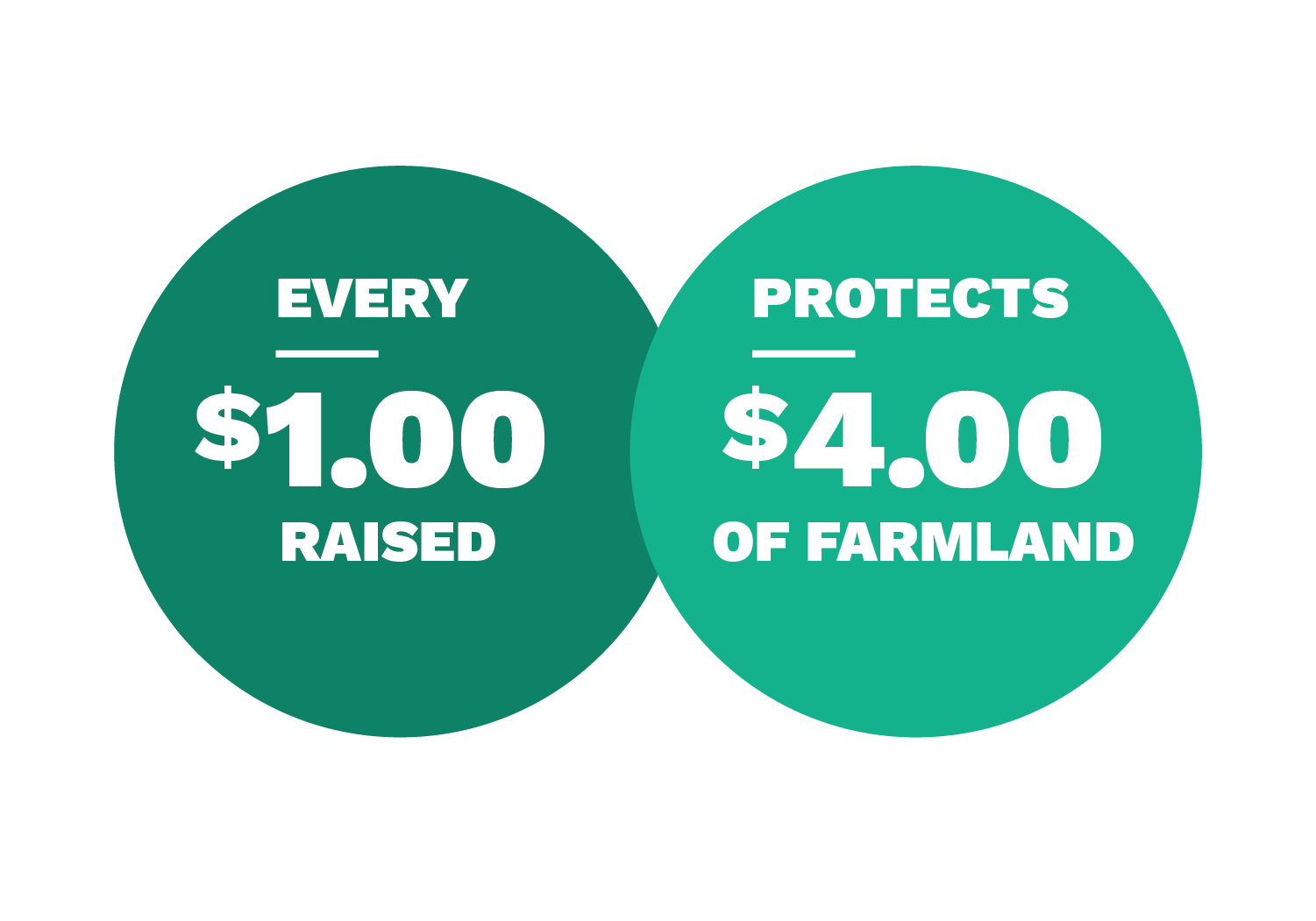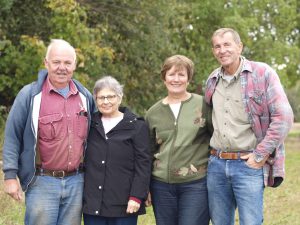
From Our Fall 2014 Newsletter
In the heart of the agricultural corridor along Center Highway sits the old Green farm. The Leelanau Trail stretches back off to the east, and to the west is a beautiful, old red barn. On a crisp fall morning, I pull off next to the barn to meet brothers Bill and Don Kiessel and Don’s wife Jan. I stand looking out over 40 acres recently sowed with rye and Kentucky bluegrass, lined with red flags in preparation for rows of tart cherries that will cover the landscape by next spring. Don and Bill grow animated as they describe the row crops once planted here; explain why they took down windbreaks to make way for cherries; and point out perennial grasses planted to prevent erosion. Then Bill pauses for a moment and remarks, “Imagine being 74 years old and buying another farm!”
Bill and Don purchased this 67-acre parcel from Bill Green last fall with the intention of maintaining farmland on both sides of the road and applying for a conservation easement. “We’d been asking Bill Green about buying his farm for a while,” Don explains, adding that Green is the great-grandson of the original farmer, and it was important to him that the land stay a farm. The Kiessels worked with Tom Nelson to apply for a Federal Agricultural Lands Easement (ALE). The ALE program provides matching federal funds for farmland conservation. This summer they received news that their parcel, with its excellent soils and community conservation value, qualified for funding.
Although Bill and Don are still relatively new to this land, they are certainly not new to the area. The brothers were born and raised on a farm just down the road – a subsistence farm with cows, chickens, vegetables, and 10 acres of cherry trees. By the time Don was 23, he already knew that he wanted to settle down in Leelanau County on a place of his own, with his wife Jan and their growing family. Don drove up and down the back roads, asking every farm family if they wanted to sell. Finally, Lena Rader and Stewart Grayvold on Fort Road agreed to sell Don their farm, but just a lot at first. “We went out to the south-east corner of the farm and walked along Fort Road. Steward asked, ‘Is this far enough?’ I said, ‘No, let’s go a little farther.’ We paid $1,000 for a lot in 1969! That started our long-term relationship with the Rader family and eventually led to our purchase of the farm and our life of farming.” Don says, smiling.
It wasn’t until 1976 that Don, together with Bill, began farming. They started with 40 acres and 535 cherry trees, and both had full time jobs. “All our evenings, weekends, and vacations were spent on the farm,” says Don. For over two decades, all the money they made farming was reinvested in land, equipment, barns, and trees. Now they manage over 500 acres (some owned, some leased), with 250 acres in active production, including 2,500 cherry trees.
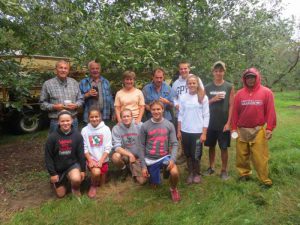
Bill and his wife Betty have two children and seven grandchildren. Don and Jan have three children, eight grandchildren, and two great-grandchildren. In the summer, three generations come together to harvest cherries. “If they are old enough to help, they are here,” Don says. “Even the little ones pick and sell cherries.” Bill’s son Mick works full time on the farm as well. He lives on the “home farm,” off Fort Road, with his family.
“We are so fortunate to have our family close by and working with us. Last week I was out pulling old roots out of this field and all it took was a couple of phone calls to get my kids out here with me,” Don explains. “And Jan has been with me every step of the way. She does everything.” Jan proudly shows me photos of the family crew harvesting together. In one photo, their granddaughter Shantel Francis, who attends Suttons Bay High School, is perched on the tractor, moving tanks of cherries.
Talk of grandkids sends Bill and Don into stories about their life growing up along Center Highway. “You could walk from here to Suttons Bay and not see a single car,” Bill says, laughing. Don graduated from Suttons Bay in a class of 22 kids; Jan was his high-school sweetheart.
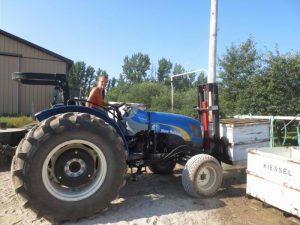
“We love to farm. We do it for our family and for our community,” Bill explains. “We allow neighbors to walk on our land; we open it up for community events like the Harvest Stompede and Cherryland Amateur Radio Club. We want to leave behind some open space so our children and grandchildren can enjoy the quality of life we grew up with.” Don describes the success his grandson had hunting on the farm just last week, and Bill shows me a photo of his son hunting on the home farm.
When asked why they decided to put their land into a conservation easement, Don grows thoughtful and talks about their old neighbor and dear friend, Rex Dobson. Rex spent his whole life on a farm down the road from the Kiessel brothers. “Rex could be going 100-miles-an-hour bringing in his hay, and then you’d show up, and he’d stop and give you all the time in the world,” Don explains. Bill tells the story of Rex leaving roses on neighbors’ doorsteps. And Jan describes the way Rex cared for his mother through her final years.
Don worked with Rex in the early 1980s, harvesting cherries. “As Rex got older, he began to talk with me about what would happen to his farm,” says Don. Eventually, Rex, who was an only child with no direct heirs, established the Rex and Ruby Ellen Farm Foundation. Don is a board member of the Foundation, which is committed to preserving the history of the farm and ensuring its future. The Ruby Ellen Farm was the first farm in Leelanau County to be protected with a conservation easement.
Through Rex’s conservation legacy, Don and Bill became familiar with the Leelanau Conservancy. “Like other farmers, we were nervous when the Conservancy started,” Don explains, “but as we watched the county grow and more and more land get split up – we began to realize how very fortunate we are to have the Conservancy here. Farmland preservation began with just a parcel here and a parcel there, but it really adds up. And now we have a beautiful corridor protected along Center Highway. It really is something significant.”
“We ask ourselves: what do we want to leave behind? Life isn’t about money. We want to set an example for our kids and continue to share the life we love with them.”
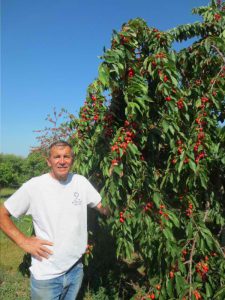
Don and Bill Kiessel’s application for the ALE Program has been approved and the transaction will be finalized in the coming year. The Leelanau Conservancy will purchase a conservation easement on the farm, permanently removing development rights. Half of the cost will come from federal dollars; the Conservancy will contribute twenty-five percent and the Kiessels will donate another quarter of the value. As Don explains, selling the development rights to the Conservancy is a good way for the brothers to “pull some value out of the land and maybe step back a bit from the hard work of farming.”
Jan smiles at this comment. She shows me a photo of Bill and Don during harvest last summer – both men in the entrance to their barn. Bill is leaning up against a barrel and Don is resting on the edge of a tractor. “This never happens!” she says emphatically, “They never sit still!”
To be long past what many consider “retirement age” and still going strong – farming together, planting new trees, even buying more land – this is a testament to the dedication of the Kiessel brothers and their commitment to the life they’ve built in Leelanau County.
As Don says, “The longer you own land, the more attached to it you grow.”
– Zane Kathryne Schwaiger
